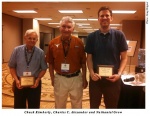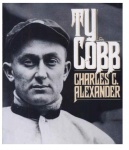Charles Alexander: Thoughts on Ty Cobb and the Deadball Era
Editor’s note: This article first appeared in the SABR Deadball Era Committee’s September 2015 newsletter.
By John McMurray
 In his remarks at the Deadball Era Committee meeting at SABR 45 in Chicago, Dr. Charles Alexander, Distinguished Professor Emeritus of History at Ohio University and a 2011 recipient of the Henry Chadwick Award, suggested that the period of baseball which this committee studies may be named imprecisely: “‘Deadball Era’ is a convenient term, and I’m not advocating we call the period from 1900 to 1919 something else, but I would suggest that it’s a misnomer,” Alexander said.
In his remarks at the Deadball Era Committee meeting at SABR 45 in Chicago, Dr. Charles Alexander, Distinguished Professor Emeritus of History at Ohio University and a 2011 recipient of the Henry Chadwick Award, suggested that the period of baseball which this committee studies may be named imprecisely: “‘Deadball Era’ is a convenient term, and I’m not advocating we call the period from 1900 to 1919 something else, but I would suggest that it’s a misnomer,” Alexander said.
In particular, Alexander took issue with having some kind of official division between baseball played in the late 19th century and baseball played in the early 20th century: “Why do we date the ‘modern era in baseball history’ from 1900? Did anything happen in baseball to justify that periodization, apart from the emergence of the American League and the creation of the National Commission as baseball’s governing body? Could anything really have happened in baseball from 1899 to 1900 or 1901 that would make you say, ‘Okay, this is pre-modern, and that’s post-modern’? I don’t get it. I guess with the rise of the American League or with the promotion of the American League, they did something new so we’re in the modern era. If you were Honus Wagner, for example, would you have come to spring training in 1900 and said, ‘Hey, I play in the modern era now!’ I just don’t think it has a legitimacy.”
Alexander noted that, to his knowledge, no changes were made to the baseball itself between 1899 and 1910 which would have prompted observers to feel that the ball had been suddenly stripped of its vitality. The ball, Alexander said, “was as dead as it had been, and it was as dead as it would continue to be.” Even when offensive numbers spiked during the 1911 and 1912 seasons, the Deadball Era remained “a period of pitching domination,” he said. “With all the additional hitting going on in 1912, Joe Wood won 34 games, Walter Johnson won 33 games, Ed Walsh 27, Eddie Plank 26, Bob Groom — sort of a forgotten star pitcher of that period — 24 games.”
Though it had nothing to do with the ball itself, Alexander cited the rise in the pitcher’s mound, the introduction of the foul strike rule, and improved playing surfaces as factors that worked in pitchers’ favor, thus resulting in lower offensive output. Better gloves helped fielding percentages to improve by a larger percentage during the first decade of the 20th century than in any subsequent decade, he added.
“So all of these factors that I’ve mentioned resulted in a corresponding decline in batting averages from 1903 — I’m using 1903 as my baseline because both leagues were using the foul strike rule — to 1910, a decline in the National League from .269 to .256, and in the American League from .255 to .243,” Alexander said. “And, of course, corresponding declines in runs earned and earned run average. So those are some of the circumstances that created what we call the Deadball Era in that nineteen-year period.”
 In addition to writing renowned biographies of Rogers Hornsby and John McGraw, Alexander is best known in baseball circles for his 1984 biography of Ty Cobb.
In addition to writing renowned biographies of Rogers Hornsby and John McGraw, Alexander is best known in baseball circles for his 1984 biography of Ty Cobb.
“(The Cobb biography) was my first venture into baseball history,” he said. “It was a good way to start because I found Ty Cobb to be an absolutely fascinating man. As I had suggested in the introduction to that book, I think Ty Cobb would have been very successful in a whole lot of lines of endeavor, not just baseball. He was a very intelligent man, a very resourceful man, a very insightful man about what he wanted to do with his life.
“Cobb did not change the way baseball was played, I think we would all recognize, as Babe Ruth did, starting in 1919 and 1920. What Cobb did was bring to its highest level of excellence and expertise the style of baseball that was being played when he reached the major leagues in 1905 at the age of eighteen. I would suggest that as much as Ruth dominated the game in 1920, Cobb was the dominant player in the two decades we know as the Deadball Era.”
Noting that there are two new books recently published on Cobb’s life, Alexander also wondered whether there is new ground to cover: “Since Oxford University Press published my biography of Cobb in 1984, so much has been written about him that I can only scratch my head when I try to think of anything new that is accurately new that is to be said about him. We now have more biographies of Ty Cobb than we have biographies of President James K. Polk, who was arguably our most successful president. I did not say, the president with whose policies we could be most in agreement or should most admire. But in terms of the history of James K. Polk’s four years as president, accomplishing the four things he came into office to accomplish, he was our most successful president.”
Cobb, Alexander said, “has become basically a caricature, as given to us by people who refuse to take the trouble to scrutinize the large amount of Cobb mythology and folklore and go ahead and blindly accept it and pass it along. Well, to be honest, that situation both saddens and angers me because I think there’s a great deal understood about Ty Cobb that people refuse to understand … I just think it’s very unfortunate that a very complicated man and a very great baseball player has been made into this caricature. As popularly understood today I say ‘popularly understood’ — Ty Cobb was a ranting lunatic. He was a mean-spirited man. Off the field, he was a vicious enemy of everybody on it. He was generally without friends and generally uninterested in having any friends. In short, he was an altogether despicable human being. That’s the popular image. And I’m afraid we’re stuck with it, despite the best efforts of some of us to get through the caricature and get through to the real man. And, as I said, that situation both saddens and angers me, but I guess there’s not anything we can do about it at this point.”
Alexander discussed his own approach to Deadball Era research as well and continued with his thoughts on how to cite dialogue properly: “Well, of course, everybody from that time period is dead … So what are we going to do — we can’t talk to these people. A certain amount of correspondence and other kinds of primary materials, the kind of thing that historians really long for, is available. The Cobb collection at the National Baseball Library, for example, is fairly extensive. It’s one of the largest, in fact, of an individual player at Cooperstown. Still, we mostly have to rely on records and contemporary coverage in daily newspapers, the weekly sports reporting news, Sporting Life …”
“I don’t write dialogue,” Alexander said. “And, frankly, for all the value, for example, of Fred Lieb and the other team histories in the old Putnam Series, it just jars my sensibilities to read the invented dialogue that the authors of those books put into peoples’ mouths. Fiction writers are free to invent dialogue. People trying to write serious history shouldn’t do that. So what I look for, especially, is quotable material, from players, managers, owners, sportswriters, whoever. Quotable material can be used to illustrate and enliven and punctuate the narrative.”
“On a few occasions, I have quoted conversations but only as a conversation has been reported by a participant or eyewitness. For example, I included one bit of dialogue in my 2011 book Turbulent Seasons. There’s a conversation between A.G. Spalding and John Montgomery Ward in December 1890 in the aftermath of the collapse of the Players’ League. But that conversation was reported by Tim Murnane of the Boston Globe who arranged the meeting between Spalding and Ward at the Manhattan Club and sat in on the meetings. I think it is fine to include dialogue if you have that kind of person who actually witnessed the dialogue taking place.”
Alexander concluded his remarks with a tale about “a lost and precious primary source.” In 1982, while researching his biography on Cobb in Cooperstown, Alexander said he listened to a tape recording of Cobb, provided to him by Tom Redding, then assistant to Cliff Kachline at the Baseball Hall of Fame. Kachline himself said that he didn’t even know such a tape existed. Alexander cited the two-hour tape extensively in his book, where Cobb early in 1958 “reminisced in considerable detail about his boyhood, his careers in baseball and business, his life in general.” But two years later, when Alexander returned to the Hall of Fame, Alexander mentioned the Cobb tapes to Tom Heitz, who had succeeded Kachline as the Hall of Fame’s Archivist. “Tom was dumbfounded to hear about them,” said Alexander, and the tapes could not be found. Even though Heitz began a search for the tapes and an FBI agent even called Alexander to ask about them, the tapes have never been found.”
“I actually did hear them and sat there and listened to them,” Alexander said, “but I don’t know. I’m sure the National Baseball Library Archives are now managed more systematically and efficiently now than they were thirty years ago. But it was far too late as far as the Cobb tapes were concerned.”
JOHN McMURRAY is chair of SABR’s Deadball Era Research Committee. Contact him at deadball@sabr.org.
- Related link: Read “The Georgia Peach: Stumped by the Storyteller,” by William R. Cobb (The National Pastime, 2010)
Originally published: September 15, 2015. Last Updated: September 15, 2015.


